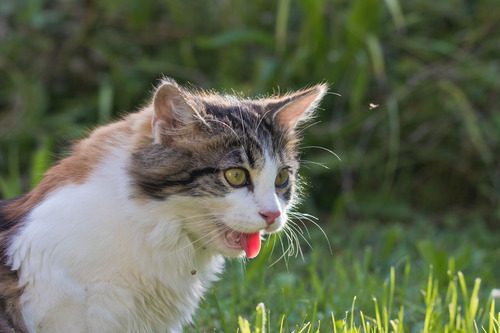What To Do if Your Cat is Having Troubles Breathing
Watching your cat struggle to breathe can be a terrifying experience for any pet owner. Unlike occasional sneezing or minor congestion, labored breathing is often a sign of a more serious underlying condition that requires immediate attention. From respiratory infections and asthma to heart disease and airway obstructions, there are many reasons why a cat may have trouble breathing. In this blog, we’ll review the warning signs and help you understand how to respond so you can help protect your cat’s health and potentially save their life. If you notice your cat breathing rapidly, wheezing, or showing signs of distress, contact Parrish Veterinary Clinic & Urgent Care right away by calling (941) 216-2335 or visiting our clinic for urgent evaluation.

Recognizing the Signs of Breathing Difficulties in Cats
Common signs that your cat is having troubles breathing include:
- Open-mouth breathing or excessive panting
- Wheezing or raspy breathing sounds
- Coughing or choking
- Rapid or shallow breaths
- Blue or pale gums
- Lethargy or weakness
If you notice any of these symptoms, seek immediate veterinary attention at Parrish Veterinary Clinic & Urgent Care by calling (941) 216-2335.
Possible Causes of Breathing Troubles in Cats
There are many reasons why a cat may be having troubles breathing, ranging from mild conditions to life-threatening emergencies.
Respiratory Infections
Upper respiratory infections (URIs) are a common cause of breathing difficulties in cats. Viruses such as feline herpesvirus or calicivirus can lead to congestion, sneezing, and nasal discharge, making it harder for your cat to breathe. Bacterial infections may also contribute to severe respiratory distress.
Asthma and Allergic Reactions
Feline asthma is a chronic condition that affects many cats, particularly those exposed to allergens such as dust, smoke, pollen, or certain cleaning products. During an asthma attack, a cat may exhibit wheezing, coughing, or open-mouth breathing. Allergic reactions to insect bites or food can also cause swelling in the airway, making breathing difficult.
Heart Disease
Cats with underlying heart disease may develop fluid buildup in the lungs, known as pulmonary edema. This condition can lead to labored breathing, lethargy, and even fainting episodes. Your veterinarian can diagnose heart conditions through X-rays and specialized tests.
Foreign Objects and Obstructions
A foreign object lodged in the throat, such as a small toy, piece of string, or food item, can cause sudden breathing difficulties. If your cat suddenly starts choking, coughing, or pawing at their mouth, a blockage could be the cause.
Trauma or Injury
Physical injuries, such as being hit by a car or falling from a height, can cause internal damage to the lungs or airway. Rib fractures or punctured lungs can make breathing painful and difficult. Any cat experiencing breathing troubles after an accident requires emergency veterinary care.
Pleural Effusion
Pleural effusion occurs when fluid accumulates in the chest cavity, preventing the lungs from fully expanding. This condition can be caused by infections, heart disease, or even cancer. Cats with pleural effusion may breathe rapidly and struggle to move comfortably.
Immediate Steps to Take If Your Cat is Having Troubles Breathing
If you suspect that your cat is having troubles breathing, it is crucial to act quickly. While at-home treatments are not advised, there are steps you can take to safely transport your cat to Parrish Veterinary Clinic & Urgent Care.
- Stay Calm: Cats are highly sensitive to their owner’s emotions. Remaining calm will help prevent additional stress.
- Minimize Handling: Avoid excessive movement or handling, as this may worsen breathing difficulties.
- Provide a Quiet Environment: Keep your cat in a cool, quiet space while you prepare for transport.
- Do Not Delay: Seek immediate veterinary care. Call Parrish Veterinary Clinic & Urgent Care at (941) 216-2335 to inform us that you are on the way.
How Veterinarians Diagnose and Treat Breathing Difficulties
Once you arrive at Parrish Veterinary Clinic, our team will conduct a thorough examination to determine the underlying cause of your cat’s breathing troubles. Diagnosis and treatment may include:
Diagnostic Tests
- Physical Examination: Your veterinarian will listen to your cat’s breathing with a stethoscope to detect abnormalities.
- X-rays and Imaging: Chest X-rays or ultrasound scans may be used to identify lung disease, fluid buildup, or structural issues.
- Blood Tests: A blood panel can help determine if an infection, inflammation, or underlying disease is present.
- Oxygen Therapy: In cases of severe respiratory distress, oxygen support may be provided immediately to stabilize your cat.
How Is Trouble Breathing in Cats Treated?
- Medications: If your cat has asthma or an allergic reaction, medications such as bronchodilators, antihistamines, or corticosteroids may be administered.
- Fluid Drainage: If pleural effusion is detected, your veterinarian may perform a procedure to remove excess fluid from the chest.
- Surgery: If a foreign object is obstructing the airway, surgical intervention may be necessary.
- Long-term Management: Cats with chronic conditions such as asthma or heart disease may require ongoing medication and lifestyle adjustments.
Cats are masters at hiding illness, so any signs of breathing difficulties should be taken seriously. If you notice labored breathing, blue gums, or prolonged coughing episodes, do not wait—contact Parrish Veterinary Clinic & Urgent Care immediately at (941) 216-2335.
